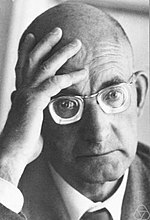P. S. Alexandrov
| Pavel Sergeyevich Alexandrov | |
|---|---|

Pavel Sergeyevich Alexandrov
|
|
| Born |
7 May 1896 Bogorodsk, Moscow Governorate, Russian Empire |
| Died | 16 November 1982 (aged 86) Moscow, Soviet Union |
| Nationality | Soviet Union |
| Alma mater | Moscow State University |
| Scientific career | |
| Fields | Mathematics |
| Doctoral advisor |
Dmitri Egorov Nikolai Luzin |
| Doctoral students |
Aleksandr Kurosh Lev Pontryagin Andrey Tychonoff |
Pavel Sergeyevich Alexandrov (Russian: Па́вел Серге́евич Алекса́ндров), sometimes romanized Paul Alexandroff or Aleksandrov (7 May 1896 – 16 November 1982), was a Soviet mathematician. He wrote about three hundred papers, making important contributions to set theory and topology. In topology, the Alexandroff compactification and the Alexandrov topology are named after him.
Alexandrov attended Moscow State University where he was a student of Dmitri Egorov and Nikolai Luzin. Together with Pavel Urysohn, he visited the University of Göttingen in 1923 and 1924. After getting his Ph.D. in 1927, he continued to work at Moscow State University and also joined the Steklov Mathematical Institute. He made lifelong friends with Andrey Kolmogorov, about whom he said: "In 1979 this friendship [with Kolmogorov] celebrated its fiftieth anniversary and over the whole of this half century there was not only never any breach in it, there was also never any quarrel, in all this time there was never any misunderstanding between us on any question, no matter how important for our lives and our philosophy; even when our opinions on one of these questions differed, we showed complete understanding and sympathy for the views of each other." According to some researchers, the two were involved in a homosexual relationship in the 1930s, while others deny this and suppose that this rumour was spread in the 1950s in order to rehabilitate them as the participants of the Luzin affair.
Alexandrov was an active participant in the political offensive against Luzin which is known as the Luzin affair (1936). According to some sources, he was pressured to denounce Luzin and later Aleksandr Solzhenitsyn in order to prevent official notice of his lifelong homosexual relationship with Andrey Kolmogorov.
...
Wikipedia
